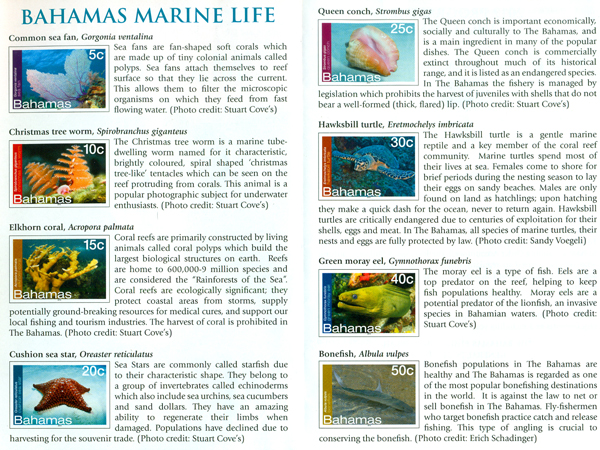|
From:TheBahamasWeekly.com Bahamas Information Services Updates
Nassau, Bahamas – The Bahamas Postal Service released a new Definitive Stamp series today (Jan. 3, 2012) that depicts the marine life of The Bahamas in a 16 stamp series. The new issue will remain on the market until the year 2017. The stamps range in price from five to 80 cents and from one to 10 dollars. The series features the following: Common sea fan, Christmas tree worm, Elkhorn coral, Cushion sea star, Queen conch, Hawksbill turtle, Green moray eel, Bonefish, Spider Crab, Caribbean spiny lobster, Nassau grouper, Yellowtail snapper, Great barracuda, Spotted eagle ray, Caribbean reef shark and Bottlenose dolphin. The Queen conch is a main ingredient in many Bahamian dishes. It is of economic, social and cultural importance to The Bahamas. Sea Stars are commonly referred to as starfish due to their shape. They belong to a group of invertebrates called echinoderms which also include sea urchins, sea cucumbers and sand dollars. The Christmas tree worm is a marine tube-dwelling worm named for its brightly coloured, spiral shaped ‘Christmas-tree like’ tentacles. Sea fans are fan-shaped soft corals which are made up of tiny colonial animals called polyps. Sea fans attach themselves to reef surfaces so that they lie across the current. Coral reefs are primarily constructed by living animals called coral polyps which build the largest biological structures on earth. The Hawksbill turtle is a gentle marine reptile and a key member of the coral reef community. Marine turtles spend most of their lives at sea. In The Bahamas all species of marine turtles, their nests and eggs are fully protected by law. The moray eel is a type of fish. Eels are a top predator on the reef that helps to keep fish populations healthy. Bonefish populations in The Bahamas are healthy and The Bahamas is regarded as one of the most popular bone-fishing destinations in the world. Spider crabs are a family of long-legged marine crabs of which there are 700 species. The spiny lobster inhabits coral reefs, mangroves, sea grass beds and the open oceans during different phases of its life’s history. The harvest of spiny lobster referred to locally as ‘crawfish’ is a multi-million dollar industry in The Bahamas. The Nassau grouper is found in the Western Atlantic, Caribbean Sea and the Gulf of Mexico. It is a top reef predator that contributes greatly to the health of the coral reefs. The Nassau grouper is the most important fin fish resource in The Bahamas. The Yellowtail snapper is one of many species of snapper found in Bahamian waters. The Barracuda is a top predator in the ocean. It is a curious fish and is commonly seen by divers and snorkelers hovering over shallow areas and reefs. Spotted eagle rays are common in shallow water and on coral reefs and can often be observed swimming in small groups. Sharks are a valuable asset to The Bahamas and contribute approximately 78 million dollars to the economy annually through dive tourism. In 2011 The Bahamas passed legislation to prohibit the commercial exploitation of all sharks. The bottlenose dolphin is a marine mammal commonly found in Bahamian waters. Dolphins are highly intelligent and communicate with each other with a variety of sounds.
|
